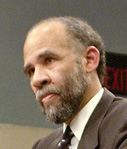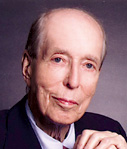Celebrated civil rights litigator John Payton has died at age 65. He was the lead counsel throughout the university’s landmark case Gratz v. Bollinger, the LSA undergraduate admissions case argued in 2003 before the Supreme Court of the United States.
Payton was remembered by President Barack Obama as a “personal friend” and “a true champion of equality.”

File photo/Marcia Ledford, U-M Photo Services.
Payton also led defense of the companion case Grutter v. Bollinger, involving the Law School, through successful arguments to the Sixth Circuit Court of Appeals. U-M President Mary Sue Coleman remembered him as “a gifted attorney and a deeply committed individual.
“John’s dedication to equality was unparalleled, and all of society benefits from his contributions. We will miss his brilliance and his passion, but will feel his impact for generations,” Coleman said.
At the time of his death, Payton was serving as the sixth president of the NAACP Legal Defense and Educational Fund, where he took the helm in 2008.
“John Payton was an extraordinary advocate and litigator on behalf of the civil rights community and others,” said Oberlin College President Marvin Krislov, who was U-M vice president and general counsel during the Gratz and Grutter cases. “We were fortunate to have him represent the University of Michigan in our admissions cases. He leaves a legacy that will always be remembered and honored.”
In defense of both Gratz and Grutter, Payton defended the consideration of race in admissions and successfully argued that a diverse student body, including elements of race and ethnicity, is a compelling interest in higher education, and effectively invoked the principal of “critical mass” to help illustrate diversity’s contribution to the educational experience of all students.
“John Payton was a brilliant lawyer, civil rights leader, and colleague who played a critical leading role in U-M’s defense of the educational value of a diverse student body,” said Jonathan Alger, incoming president of James Madison University, who is now senior vice president and general counsel at Rutgers University. During Gratz and Grutter, Alger was U-M’s lead assistant general counsel in both cases. “His passion for justice and equal opportunity was heartfelt and contagious, and his commitment was backed up with thoughtful argument and a lifetime of experience. He made a real difference in the world.”
A native Californian and graduate of Pomona College in Claremont, Payton successfully lobbied for increased diversity among the student body and establishment of a black studies program. He went on to Harvard Law School, where he continued as a student to work on major civil rights issues, including defense of participants in the American Indian Movement.
In appreciation of its pro bono work for the NAACP in Mississippi, Payton joined the Washington, D.C., firm Wilmer Cutler Pickering Hale & Dorr, where he rose to partner. He also served as corporation counsel for the District of Columbia from 1991-94, and helped shepherd South Africa’s first post-apartheid democratic elections in 1994. The National Law Journal named Payton one of “The Decade’s Most Influential Lawyers” in 2010.
Nine days before Obama won the U.S. presidency, Payton delivered U-M’s 2008 Nancy Cantor Distinguished Lecture, during which he shared this thought, “Democracy at its core requires that ‘all the people’ be included in ‘we the people.’ That doesn’t mean we have to see each other as the same. We must understand that our differences enrich our collective perspectives.”
Joseph Neal Payne
Former School of Education faculty member Joseph Neal Payne, 82, died March 6 surrounded by his family in Charlottesville, Va.
He was born Aug. 10, 1929, in Galax, Va., to Solomon Luther Payne and Annie Elizabeth Cox Payne. He earned a bachelor’s degree in education from Roanoke College, the beginning of a long career dedicated to teaching. Roanoke was particularly special to Payne as it was there that he met his sweetheart Ruth. They were married in 1951 at the chapel on the University of Virginia grounds, where he was completing his doctorate in mathematics education.

Photo courtesy Payne family.
Payne taught at Indian Springs School in Birmingham, Ala., and the University of Wisconsin in Madison before joining the faculty of the U-M School of Education, where he worked for 40 years. He wrote “Mathematics Learning in Early Childhood for the National Council of Teachers of Mathematics,” a K-8 mathematics series, high school algebra textbooks, and several research publications. He was a leader in mathematics education and had a profound effect on his colleagues, undergraduate and graduate students.
Teaching was a profession and, more importantly, a way of life for Payne. As a gifted educator and mentor, he was able to inspire confidence in his students, family members say. His lessons were characterized by his gentle demeanor and patience, and he never missed an opportunity to share his love of learning, colleagues say. The pleasure he took in education extended through all facets of his life in Ann Arbor and Payne was a proud Wolverine who could be counted on to answer the phone on football Saturdays with an enthusiastic, “Go Blue!”
His love of university life traveled with him when he and Ruth retired to Charlottesville in 1997. He enjoyed his enrollment in many continuing education classes at the Curry School of Education, going to university theatre and music productions, and cheering for the Cavaliers unless they were playing Michigan. Payne loved his hometown, and stayed connected to his Carroll and Grayson County roots through frequent visits and annual Cox family reunions. An active genealogist, Payne was able to trace his ancestry for several centuries, and was an active member of the Jamestowne Society and the Sons of the American Revolution.
Payne’s commitment to teaching was only exceeded by his devotion to his family. A logical thinker who always let his heart prevail, family members say he was a dedicated son, brother, husband, father, grandfather, uncle, cousin and friend. He had a reassuring presence in the lives of those around them, and could always be counted on for unwavering support, guidance and love, they add. His actions inspired compassion and kindness in everyone around him.
In lieu of flowers, donations can be made to Westminster Presbyterian Church, 400 Rugby Road, Charlottesville, VA 22903 or to the Payne-Jones-Coxford Scholarship Fund at the University of Michigan School of Education.
—Submitted by Ellen M. Byerlein, School of Education

